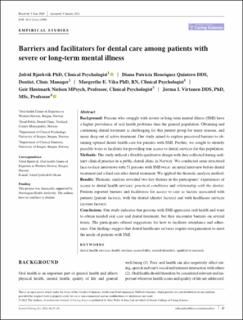| dc.contributor.author | Bjørkvik, Jofrid | |
| dc.contributor.author | Henriques Quintero, Diana Patricia | |
| dc.contributor.author | Vika, Margrethe Elin | |
| dc.contributor.author | Nielsen, Geir Høstmark | |
| dc.contributor.author | Virtanen, Jorma | |
| dc.date.accessioned | 2021-05-07T11:14:40Z | |
| dc.date.available | 2021-05-07T11:14:40Z | |
| dc.date.created | 2021-02-02T18:54:26Z | |
| dc.date.issued | 2022 | |
| dc.identifier.issn | 0283-9318 | |
| dc.identifier.uri | https://hdl.handle.net/11250/2754144 | |
| dc.description.abstract | Background: Persons who struggle with severe or long‐term mental illness (SMI) have a higher prevalence of oral health problems than the general population. Obtaining and continuing dental treatment is challenging for this patient group for many reasons, and many drop out of active treatment. Our study aimed to explore perceived barriers to obtaining optimal dental health care for patients with SMI. Further, we sought to identify possible ways to facilitate for providing true access to dental services for this population.
Methods: The study utilised a flexible qualitative design with data collected during ordinary clinical practice in a public dental clinic in Norway. We conducted semi‐structured face‐to‐face interviews with 51 persons with SMI twice: an initial interview before dental treatment and a final one after dental treatment. We applied the thematic analysis method.
Results: Thematic analysis revealed two key themes in the participants’ experiences of access to dental health services: practical conditions and relationship with the dentist. Patients reported barriers and facilitators for access to care as factors associated with patients (patient factors), with the dentist (dentist factors) and with healthcare services (system factors).
Conclusions: Our study indicates that persons with SMI appreciate oral health and want to obtain needed oral care and dental treatment, but they encounter barriers on several fronts. The participants offered suggestions for how to facilitate attendance and adherence. Our findings suggest that dental healthcare services require reorganisation to meet the needs of patients with SMI. | en_US |
| dc.language.iso | eng | en_US |
| dc.publisher | Wiley | en_US |
| dc.rights | Attribution-NonCommercial-NoDerivatives 4.0 Internasjonal | * |
| dc.rights.uri | http://creativecommons.org/licenses/by-nc-nd/4.0/deed.no | * |
| dc.title | Barriers and facilitators for dental care among patients with severe or long-term mental illness | en_US |
| dc.type | Journal article | en_US |
| dc.type | Peer reviewed | en_US |
| dc.description.version | publishedVersion | en_US |
| dc.rights.holder | Copyright 2021 The Authors. | en_US |
| cristin.ispublished | true | |
| cristin.fulltext | original | |
| cristin.qualitycode | 1 | |
| dc.identifier.doi | 10.1111/scs.12960 | |
| dc.identifier.cristin | 1886058 | |
| dc.source.journal | Scandinavian Journal of Caring Sciences | en_US |
| dc.source.pagenumber | 27-35 | |
| dc.identifier.citation | Scandinavian Journal of Caring Sciences, 2022, 36 (1), 27-35. | en_US |
| dc.source.volume | 36 | |
| dc.source.issue | 1 | |

